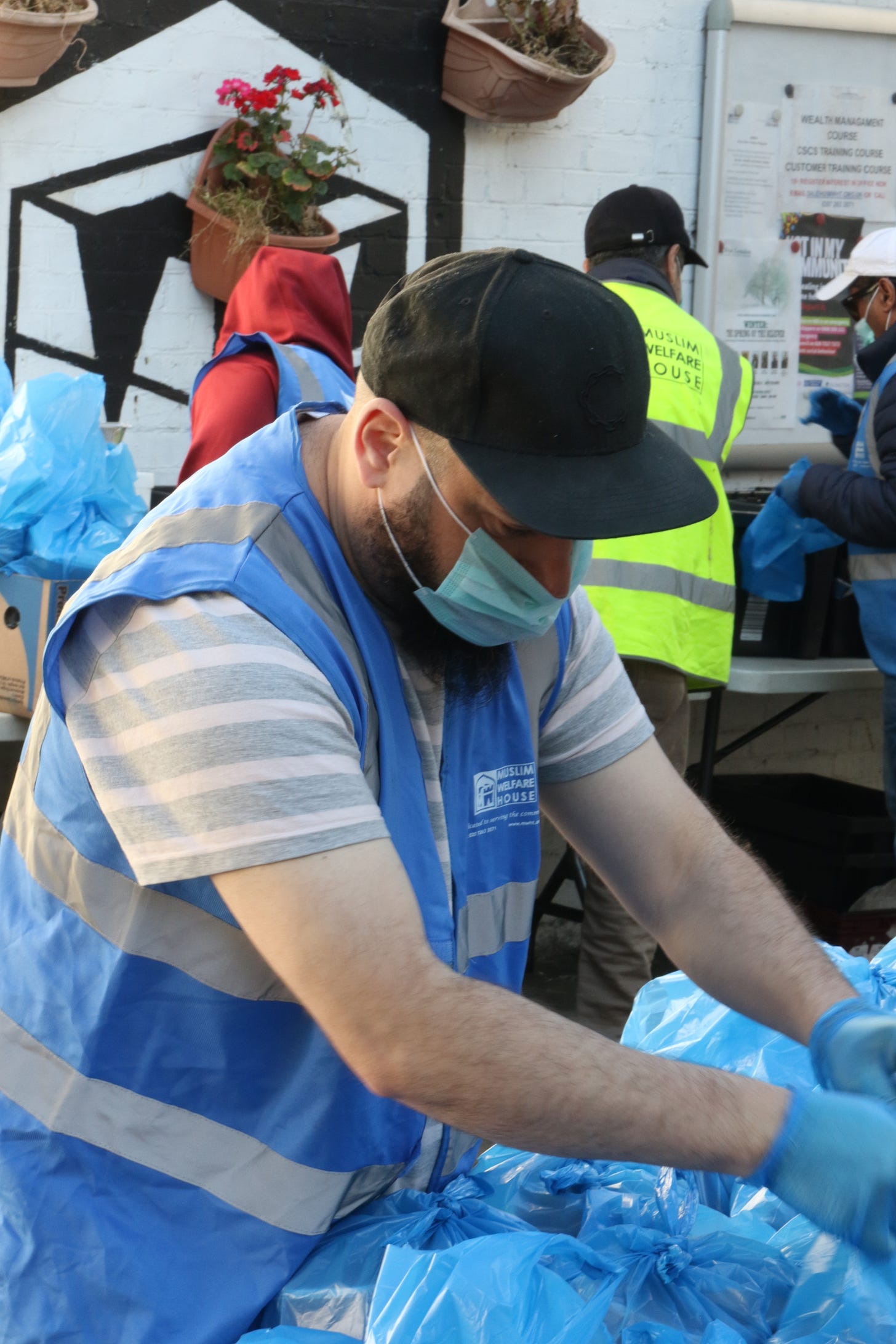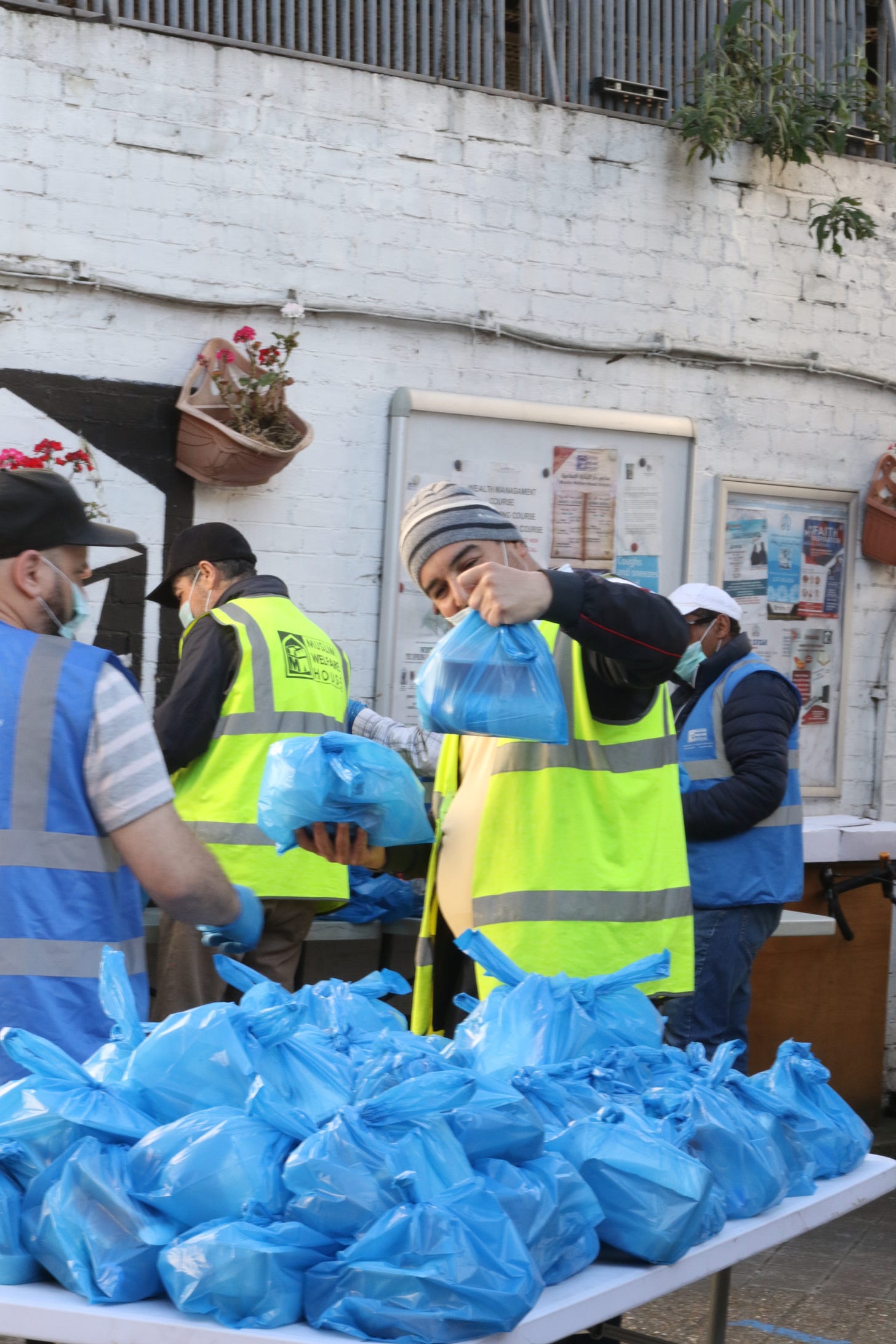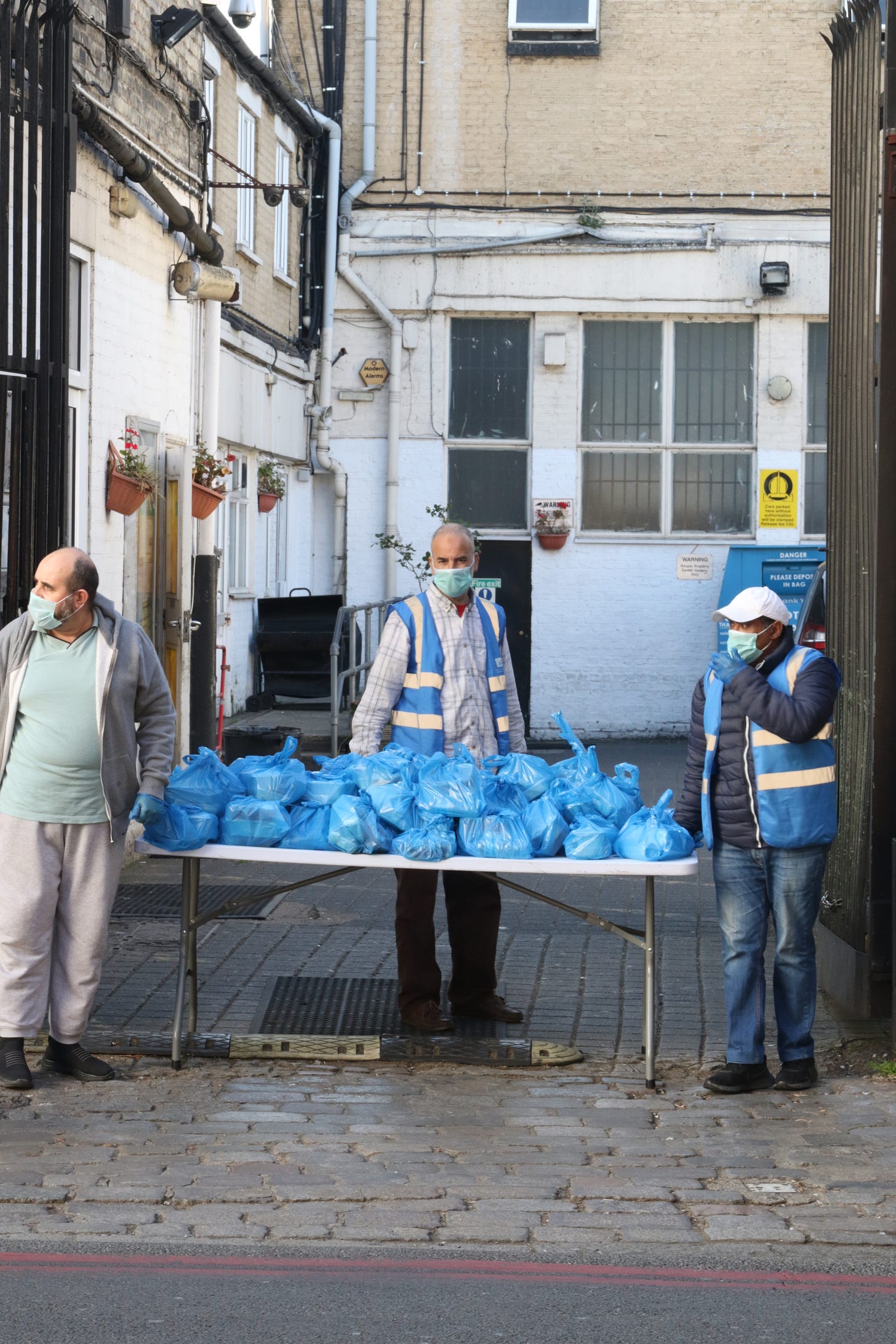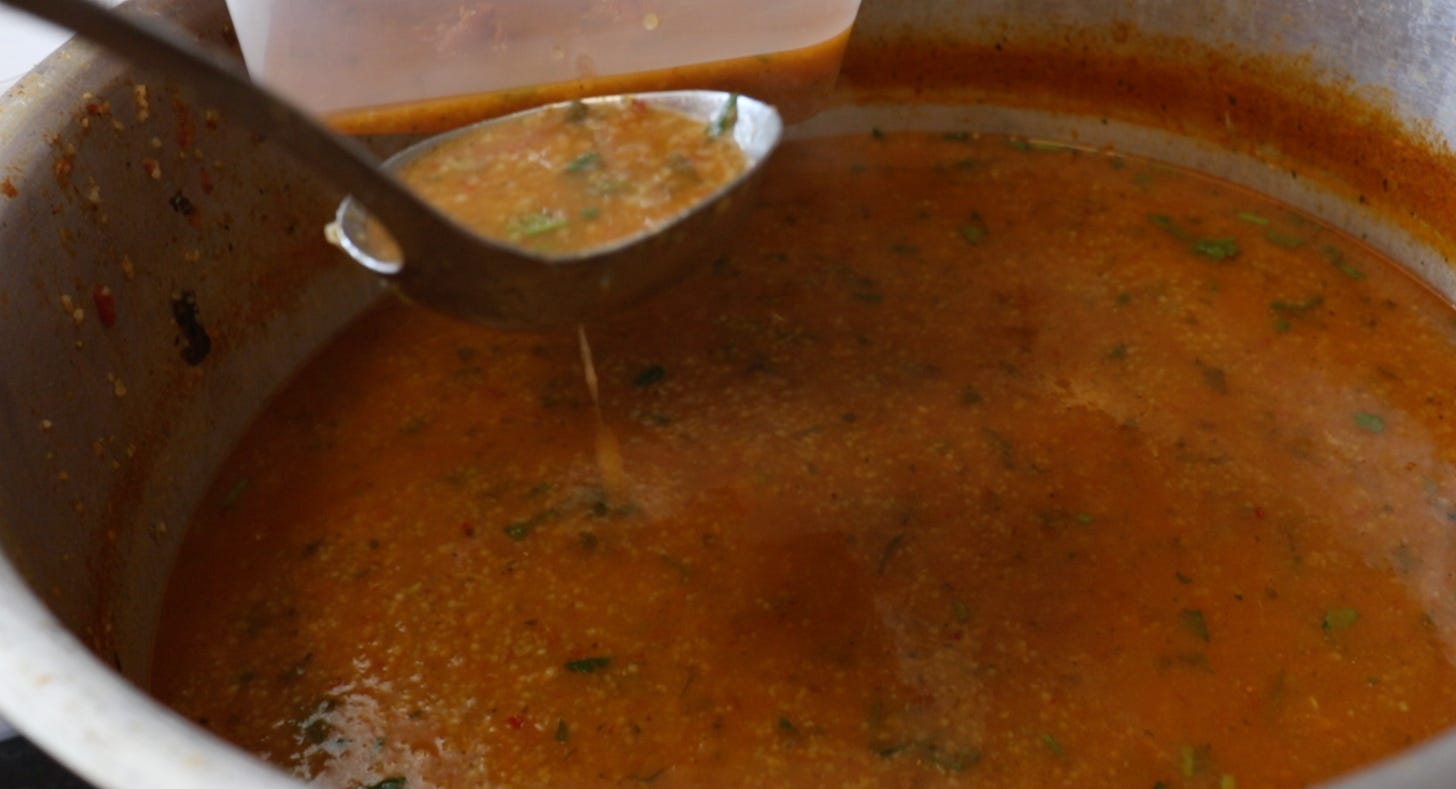Vittles x Free Word: Feeding Finsbury Park
Words by Mia Rafalowicz-Campbell and Abdul Boudiaf; Photos by Abdul Boudiaf
This edition of Vittles is the first of two articles co-commissioned with Free Word as part of their season How To Be Kind ─ a season of writing, performance, film and workshops that focuses on radical approaches to kindness. All contributors were paid by both Vittles and Free Word. You can view the rest of the season at https://freeword.org/season/how-to-be-kind/
To fund the payment of contributors, you can donate via Patreon which also gives access to all subscriber-only newsletters.
I remember the creeping unease that overtook me one evening, as I was sitting outside on the pavement watching the railway arches on Brixton’s Station Road. One one side, the side not under the railway tracks, you had a new craft beer bar and a small plates Japanese restaurant, on the other, an Ethiopian cafe and a snack bar, both with music blaring from sound systems. There were two things that made me uneasy: on the same stretch of road, not 10 metres away from each other, one whole side of the road, or almost one side, was white, and the other was not. The second thing that made me uneasy is that I was sitting at the craft beer bar.
The micro-segregations in London constantly blow my mind. I checked Google while writing this to see if anyone else had noticed, and of course the wrong side of the arches is already a part of a £4 million scheme to ‘reimagine’ the area (something I should have gathered from the arrival of Koi Ramen, whose locations in Tooting Market and Elephant Park have meant I’ve started to associate the aroma of long simmered pork bones as a harbinger of gentrification). It’s a curious form of segregation ─ in Paris they just encode it into the literal definition of the city, put a big ring road around the centre where everything inside is Paris, and everything outside, the banlieues, the immigrants, is not Paris. I’ve often thought the Peripherique-ation of London would be a disaster, although one wonders if there is any meaningful difference. In her essay on Grenfell, the writer Joanna Fuertes-Knight calls the London model “in many ways, (a) more sadistic game, where immigrant enclaves exist amongst increasingly gross levels of wealth”. Cafes frequently grin across council estates, selling produce or coffee or food that prices their neighbours out; in Kensington and Chelsea last winter I knocked on the doors of mansions and climbed the stairs of towers, often on the same road.
Today’s newsletter is set in Islington, itself a synecdoche for the political elite but also home to alarming levels of child poverty and inequality. Often these two ideas of Islington are kept separate, but if London is a big George Constanza trying to keep worlds apart, sometimes it can’t stop them from colliding. The pandemic has seen more worlds collide than ever before; the rise of mutual aid in Whatsapp groups overlap the systems of support that immigrants have relied on for decades. As Javie Huxley says of Latin Village, “these systems, however, are not a new phenomenon for BAME communities....working-class, migrant communities have inherently relied on these networks to survive”.
In Finsbury Park, these two systems have become entwined in an unexpected form, expanding each other’s reach and perhaps expanding people’s ideas of what mutual aid can be. We cannot live in our own villages. It is only in these collisions of worlds, when people realise that the two sides of one street are still the same street, that the city is made and remade.
Feeding Finsbury Park, by Mia Rafalowicz-Campbell and Abdul Boudiaf
Behind large iron gates on a crowded plot of Seven Sisters Road in north London stands an unassuming complex. This is the headquarters of Muslim Welfare House, a national charity network of community centres and mosques, and the epicentre of the local Muslim community. Over the summer months this complex was at the very heart of the grassroots movement sustaining Finsbury Park, providing free hot meals for whoever needed or wanted them. The centre’s CEO, Toufik Kacimi, beams with pride as he talks about what has been achieved here. Acting as a food distribution hub, hot meal packs were assembled and given out across the community. These packs contained boxes brimming with rice, vegetables, meat, salads and soups, sometimes alongside fruits, desserts and bottled drinks. It was a large-scale operation, starting in the kitchens of Muslim families and local restaurants. The food was organised and packed by a team of volunteers at the centre then distributed to those shielding by volunteers from Finsbury Park Mutual Aid. Initially serving up 200 meals per day, the operation quickly expanded to serve more than 600 daily meals for the best part of three months.
Finsbury Park is a neighbourhood often characterised as ‘superdiverse’ or noted for its ‘working-class flavour’. Right in the centre of Jeremy Corbyn’s Islington North constituency, the smallest in the country by area, it is dense with successive migrant communities – most notably Irish, Afro-Caribbean, Greek and Turkish Cypriot, Turkish, Kurdish, and more recently Somali and Algerian. Now a hub of the North African community, the area has been experiencing rapid gentrification thanks in part to its position as a transport hub, the patchwork shops and restaurants of Seven Sisters Road and the surrounding estates now standing in the shadows of City North, a ‘landmark cosmopolitan development’ next to Finsbury Park tube station.
For many of those receiving the food – either picking up or being delivered to – as well as the volunteers from the mutual aid group, this was their first interaction with Muslim Welfare House and the community it typically serves. For all its multiculturalism, Finsbury Park can still feel segregated ─ its mosque may have been a 2014 recipient of a Visible Quality Mark for its outreach efforts but is still characterised as ‘notorious’ for its late-’90s association with radical Islam and has worked hard to shed that tag. It was against this backdrop that Muslim Welfare House became the site of a terrorist attack during Ramadan in 2017, when Darren Osborne killed one worshipper and injured 12 others after driving a van into a crowd outside the centre.
This global pandemic, for all the horrors it has brought, has also mobilised grassroots community initiatives the world over, often bringing together those who otherwise would have had little opportunity to meet. What many involved with this initiative don’t realise, however, is that this particular project has been running in some form for 30 years, and in its home-cooked form for the best part of a decade. And at the heart of it is a network of Muslim families – mostly Muslim women – who have been consistently feeding the vulnerable from their own kitchens, out of their own pockets.
Wahiba is the matriarch of the Muslim Welfare House’s homemade meal initiative. She moved to London from Algeria in 1995 and soon settled in Finsbury Park, which was already an Algerian enclave. She started cooking for fellow Muslim immigrants following a meeting with young homeless men in the area ten years ago. One man complained about how difficult he found Ramadan, in particular how he missed his mother’s chorba, a North African soup that is traditionally eaten to break the daily fast. For Wahiba, the prospect of an iftar of fried chicken in the park, so removed from home comforts and rituals, was too much to bear. After speaking with Kacimi, who was already running a version of this service with Muslim Welfare House acting as a hub for people to meet and eat, she began to cook meals from her kitchen. She grew a network of volunteers first by word of mouth, and then by WhatsApp. “Mothers from Morocco and Algeria came, without knowing me, because they felt so happy to have an open house offered to them with honesty, a place just to cook. And then I had to struggle with a lot of people offering to help, because it was Ramadan.” As well as offers of time, Wahiba was taken aback by the numbers of donations coming in from across the various Muslim communities.
In the early days of the initiative, they were cooking 50-60 portions per day. “And then when people heard about this famous chorba,” explained Wahiba, “they started asking for more quantities, and we ended up cooking sometimes for 500-600 people.” Chorba is “the basic soup in Ramadan for Algerian and Moroccan people. They (Moroccans) call it harira, we call it chorba. It’s a soup with a lot of vegetables – mostly courgettes, potatoes, tomatoes… The secret of the chorba is the spices we use in it. But each town has got its own spices, so we make sure that during Ramadan we use different spices to represent different cultures within the soup. We call it chorba yemma, which means ‘my mum’s soup’... for me, I want them never to miss their mum’s soup.”
For Samira, a fellow volunteer and migrant to the UK, the chorba yemma is at the centre of their work. “When people are in a new country, missing their families in the holy month of Ramadan, finding someone to cook for them, to cook a soup like their mum’s… that is something. They feel [like they are at] home, and because they’re together, they feel unity.” The motivation for providing this food and this service comes from a recognition that many of these migrants occupy very precarious positions in society, and these meals serve as a lifeline: “when you feed people it is a mercy, a blessing. That changes the community, makes people feel that there is hope, makes them feel that we think about them. This is why I help.”
Never has that been more necessary than this year, when many undocumented migrants are without recourse to any public funds for support and unable to access services. “They are scared of the Home Office, they are scared to tell people ‘we exist, we are here’... The government needs to help them. If they don’t do it, [then] as a community, [because] we know each other, we know the families, we need to support them, we need to cover them, we need to protect them. So this is our law. And this is what happened in Finsbury Park.” The sense of duty in Samira’s words is matched by her anger at the failures of government. “These are women, ordinary women, who just cook in their home and make boxes of food, rice or soup. Why did our government not do anything during Ramadan? Why did they not provide free meals?”
Since early March, thousands of mutual aid groups have emerged up and down the country in a bid to protect and support the most vulnerable through the pandemic, with adequate government support so obviously lacking. Over the course of a weekend the Finsbury Park group was set up and mobilised via Facebook, WhatsApp and Google Drive, with all 6,000+ households in the ward notified over the following week in a flyering effort described as ‘remarkable’ by one of the group’s coordinators and long-time local Labour Party member Terry Conway. A core group of volunteers came together as coordinators to oversee the development of a support request and volunteer pairing system, and to work with Islington Council to support the Andover Community Centre’s weekly Surplus Food Project and foodbank, among other local services.
Yet for all the many achievements of the coronavirus-response mutual aid groups, they can be subject to a criticism of erasure, and it is important to note in the case of Finsbury Park the overlapping with a system of ad hoc support that long preceded it. It was Mustafa Almansur, one of the mutual aid coordinators and a volunteer imam at Muslim Welfare House, who spotted the opportunity for the two groups to work together in a bid to ensure the hot meals could reach those shielding, regardless of whether they were fasting: “it was a great opportunity to bridge cultural gaps and work together to create the community that we want to live in.”
Chorba yemma, and the work at the community centre, is guided by Muslim values but is also recognisable as a form of mutual aid – a term popularised by the Russian anarchist Pyotr Kropotkin. Toufik speaks of the five pillars of Islam, the third of which is zakat (charity). While in the holy month of Ramadan people typically become more charitable, he notes that Muslim Welfare House “operates mostly on goodwill.” Even before coronavirus hit, the centre has been a lifeline for other communities, in particular for the many people experiencing homelessness in the area. Yet this year its usual suite of education, training and community engagement services reached far beyond their normal boundaries, right into the homes of the most vulnerable, thanks in part to the relationship with the local mutual aid group that coordinates support for those shielding.
For Wahiba, these connections have been invaluable. “For me it was an opportunity to give the real image of Muslims.” She speaks about the difficulty of wearing a khimar, or headscarf, in modern British society. “We [as Muslim migrant women] have a tough time. For them, you are covering your hair and your brain. You are here just to take opportunities, to take social service help, but you cannot give anything. They assume that you have no knowledge.” By themselves providing informal social security structures, Wahiba and Samira were able to share parts of their identity and culture that they felt had been hidden: “Covid gave us the opportunity to show our kindness.”
Looking forward, Toufik hopes to put on an exhibition at the centre showcasing hidden goodness in the community, focusing on projects like this one. “People couldn’t understand what we were doing… they’d come and queue up and repeatedly ask ‘why are you giving away food for free?!’” Wahiba feels positively about the future: “Covid has had a really bad effect on all of us, but it has also reunited us… at the beginning we thought there would be pressure on us as Muslim foreigners, but it was the opposite, now we feel people are more relaxed, we feel more welcomed…” It might just have taken a pandemic to allow the old adage of food bringing people together to come into focus here in Finsbury Park. “Food? I use it as a green card!”
Abdul Boudiaf is a video producer who grew up in Tottenham, north London. After witnessing the 2011 London riots as a young teenager he became interested in politics beyond the ballot box, exploring these interests through the study of politics and international relations at SOAS. Abdul is the cofounder of Peoples Studio, and is passionate about reflecting the socioeconomic realities of everyday life through multimedia and film.
Mia Rafalowicz-Campbell is a writer and researcher living in Finsbury Park. She is currently commencing a PhD in transport justice, and in her spare time writes about food, identity and the city. Pre-pandemic she set up the Moveable Feasts cookbook club. You can find her sometimes on Instagram and Twitter.
The Vittles x Free Word illustration is by Charlie Fischer, an illustrator and image maker with a love for social observation. You can find their work at https://charliefischer.co.uk/








